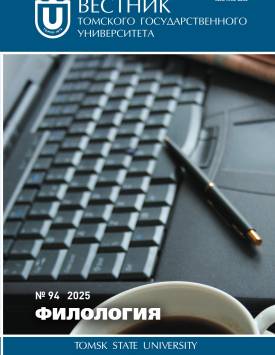"With great interest I read three of your works…": Mikhail Bakhtin in a reader's dialogue with Leonid Pinsky (based on the materials of the thinker's archive and personal library)
The article reconstructs the reader's dialogue between Mikhail Bakhtin and the literary scholar Leonid Pinsky in the 1960s and early 1970s. The subject of analysis is Pinsky's articles in the Voprosy Literatury journal and fragments of correspondence preserved in Bakhtin's archive. The study of the notes made by Bakhtin in the copies of journals in his library makes it possible to identify places of particular interest to Bakhtin the reader and to draw a conclusion about the scholar's understanding of the closeness of Pinsky's positions to Bakhtin's concept of Rabelaisian laughter. As the author emphasises, the identification and study of Bakhtin's marginalia forms an important part of contemporary Bakhtin studies. It allows us to visualise the image of Bakhtin the reader, to reveal the sequence of his work with this or that material. The transformation of "selected places" in Bakhtin's outline or Bakhtin's text provides an insight into the mechanism of adapting not only the "other word" but also the Other's thought and integrating them into a note or outline, working materials, and eventually directly into a book or article. The dialogue between Bakhtin and Pinsky on the literature of the European Renaissance, on the works of Rabelais and Shakespeare throughout the 1960s and early 1970s takes different forms - from correspondence and real communication to internal "reader's" dialogue, when the conversation with the author, agreement or dispute with him are expressed in the form of marginalia or continue in the creative transposition of the ideas of the "interlocutor", as is the case with the evaluation of Pinsky's book Renaissance Realism in The Works of Francois Rabelais and the Popular Culture of the Middle Ages and the Renaissance. This article centres on a detailed analysis of Bakhtin's notes on the pages of Pinsky's four articles in Voprosy Literatury : "The Tragic in Shakespeare" (1958), "On the Comic in Rabelais" (19s9), "The Plot of 'Don Quixote' and the New European Novel" (1960), and "The Spanish Rascal Novel and the Baroque" (1962). Bakhtin not only reads Pinsky's articles carefully and marks the fragments that interest him: the number of strikethroughs, varying from one to four, serves as a basis for identifying the most significant or fundamentally important points for Bakhtin the reader. For example, in Pinsky's article "On the Comic in Rabelais", which he carefully read, he emphasises ideas that are consonant with his own position. Traces of Bakhtin's work with these articles by Pinsky are found in the subtext of his book on Rabelais, where Pinsky is presented as the author of the best Soviet work on Rabelais. Accordingly, for Bakhtin, Pinsky's scholarly position and his vision of the literature of the European Renaissance and its individual authors (primarily Rabelais and Shakespeare) became an important confirmation not only of the faithfulness of his own scholarly position, but also of the demand for his creative research by the best representatives of Soviet literary studies. Archival materials, Bakhtin's marginalia in the pages of Pinsky's works are introduced into the academic discourse. The author declares no conflicts of interests.
Keywords
Mikhail Bakhtin, Leonid Pinsky, Shakespeare, Rabelais, Cervantes, marginalia, reader's dialogue, thinker's archive, personal library, "Voprosy Literatury" (Problems of Literature)Authors
| Name | Organization | |
| Dubrovskaya Svetlana A. | National Research Mordovia State University | s.dubrovskaya@bk.ru |
References

"With great interest I read three of your works…": Mikhail Bakhtin in a reader's dialogue with Leonid Pinsky (based on the materials of the thinker's archive and personal library) | Vestnik Tomskogo gosudarstvennogo universiteta. Filologiya – Tomsk State University Journal of Philology. 2025. № 94. DOI: 10.17223/19986645/94/11
